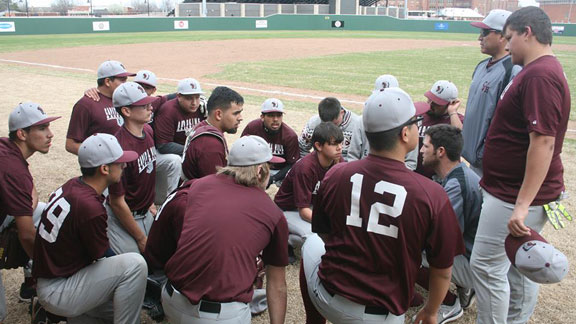When it hasn’t rained this spring, high school teams across the state have been able to get in a few games here and there.
The success of the most teams can be easily measured in the win-loss columns and the state rankings. That’s not necessarily the case at Capitol Hill.
Sporting a 4-23 overall record in mid-April, third-year coach Mike Hinckley sees more in what his team is accomplishing than just the final tally on the scoreboard. And his assessments are based more on instructions from a higher source. In fact, even being in his current position goes back three years to listening to that call.
“The Capitol Hill principal had gone to our church at the time, where my father-in-law was pastor,” Hinckley said. “And it was just about the time and not too long after I lost my job in baseball as a player. I didn’t know what was next and where the Lord was going to take me.

Mike Hinckley played with the Washington Nationals in 2008 and 2009. He is seen here pitching for Oklahoma City. Photo by Mike Durkin.
“But he approached me in church one day after the service was over and asked me if I wanted to be the head baseball coach at Capitol Hill. And I told my wife, ‘I think this is amazing. I think this is where the Lord wants me to be and wants us to be. This move is going to be a big deal. And I know this is going to be a spot where we’re going to have to dig in and work hard.’
“It was completely different than what I had grown up knowing at Moore High School as a kid, a whole lot different than what I was about to walk into, but this is where we felt like the Lord was calling us.”
Hinckley last stop in professional baseball was in Manchester, N.H., with the Toronto Bluejays’ Double-A affiliate Fisher Cats. He made it to the Major Leagues as a pitcher in 2008 and 2009 with the Washington Nationals.
After his time with the Nationals, Hinckley also had a short stint with the Oklahoma City Redhawks.
But with his playing career was over and Hinckley was working in other areas when the opportunity at Capitol Hill came his way. And he said coaching wasn’t really something he had been preparing for.
“I never really thought (about it), and I told my wife, I don’t think I’ll ever coach after I’m done playing,” Hinckley said. “I just kinda want to stay away from baseball and maybe go a different direction. But the Lord has gifted me to know how to do this, in the sense of play.
“Coaching is a whole other ballgame, so it’s been a really humbling experience to know that I’m still learning as a player, but have a whole lot to learn as a coach, so every day having to try to figure out how to get guys in the right position is very challenging and some days it can be frustrating.”
Frustration like that of a parent.
“It’s hard because you find out they’re just like your own kids at home. They don’t listen to you. They look at you like you’re crazy. But what I find is that the bigger picture here is not baseball, it’s loving these kids from the heart.
“But my assistant coach (Darrel Harjo), he’s the youth pastor at our church, and I have been here for three years, and we find that as much as this whole thing may frustrate us during the game, certain things about the aspects of baseball, we find that during that time there are so many life lessons that we’re not only trying to learn ourselves, but also teach them.”
And teaching them is key, but how to teach presented an issue for Hinckley. A day on the diamond is not the same at Capitol Hill as it was through his formative years in Moore.
“I think the biggest thing I noticed is that in Moore you grow up playing tee-ball and progress through the little leagues and develop because all you ever do is play baseball. But what I realized as I walked into this is that a lot of these kids had never played until they were freshmen in high school.”
Other sports, maybe, but not baseball and Hinckley saw just how much progress needed to be made in his first game as a coach
“I had a kid that ran probably ran a 4.5 forty, a football player, and he stole third base – and ran right through it. I realized that, man, this is going to be interesting. Learning the rules and those are all the things I assumed they already knew, but I had to teach and have to teach on a daily basis.”
And that is what he is doing, along side his other jobs as an intern accountant at Hertz, an accountant with a payment processing company, an online student and another job for which he might seem well-suited, a pitching and hitting instructor.
Add house cleaning to the mix as well, as he stays home a couple of days each week with his and his wife’s three children.
Hinckley’s arrival at Capitol Hill was also part of a wave of change for its baseball program. A new coach, a new field, and new direction from the Oklahoma City schools’ athletic director, Keith Sinor.
Continued on Page 2. Click below.


